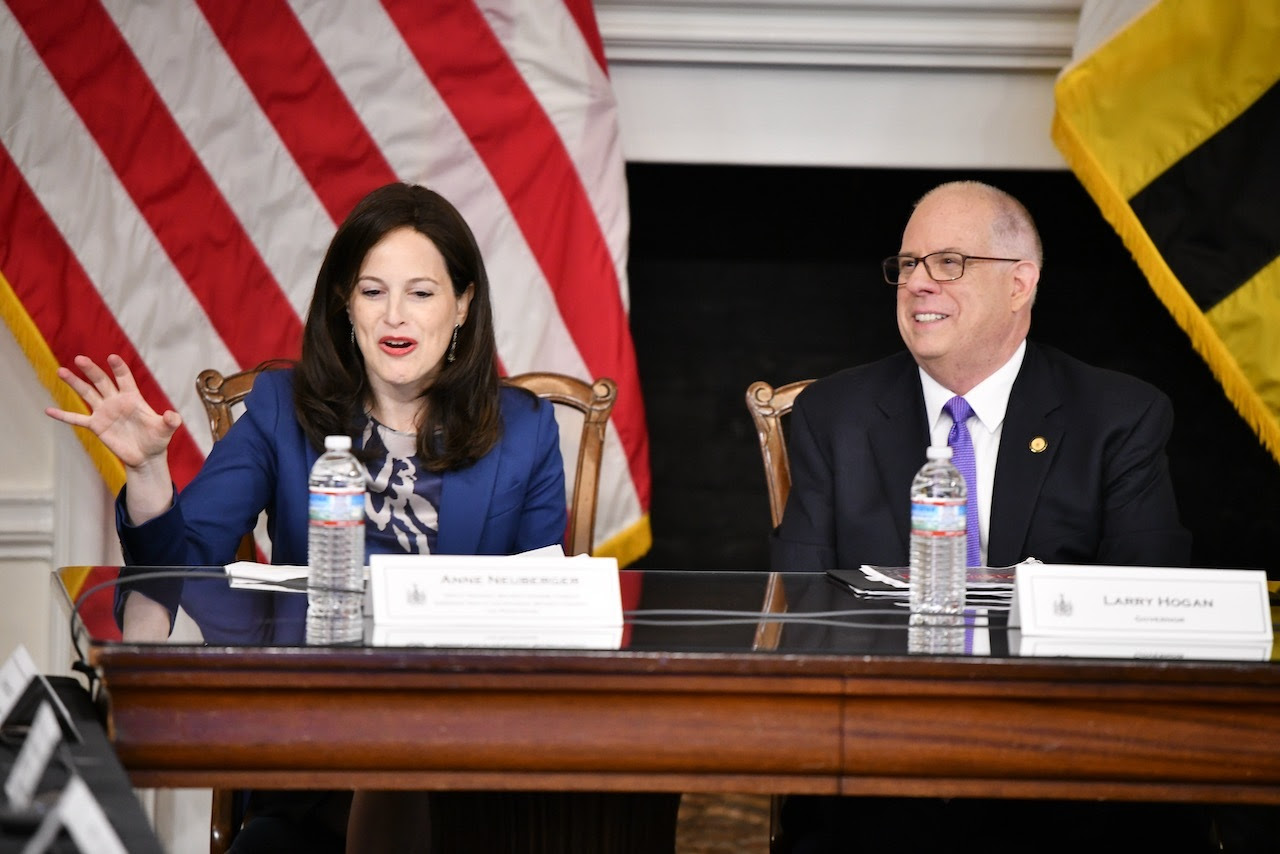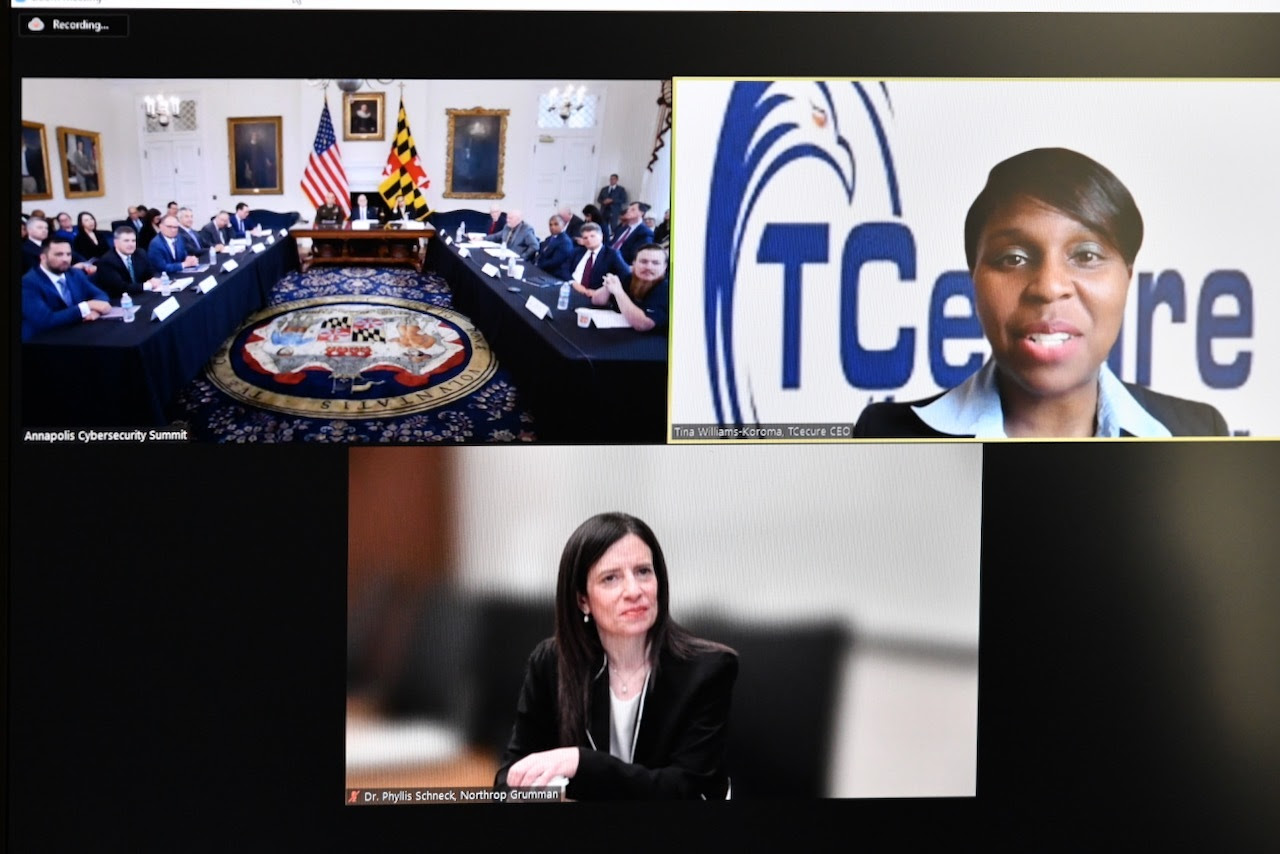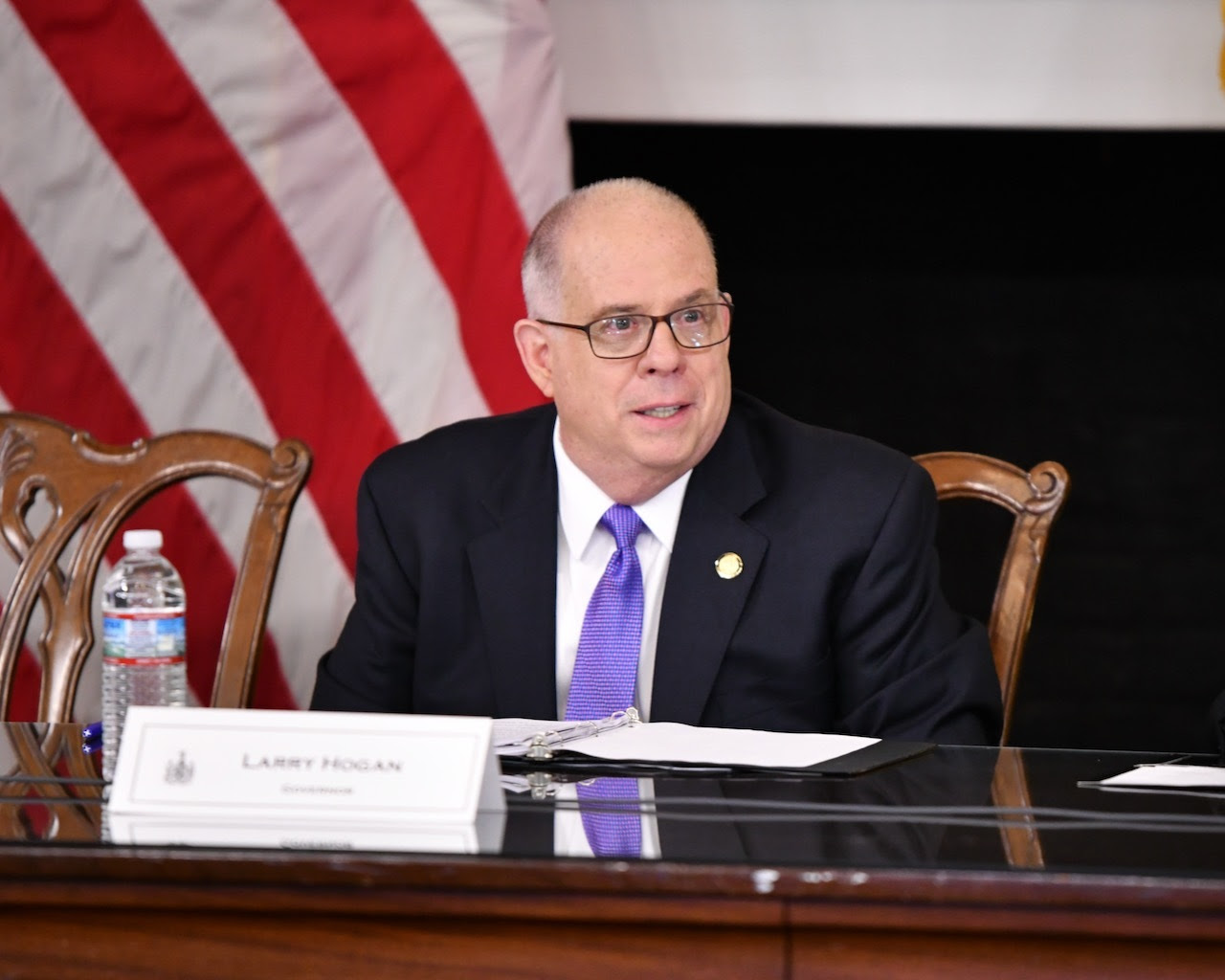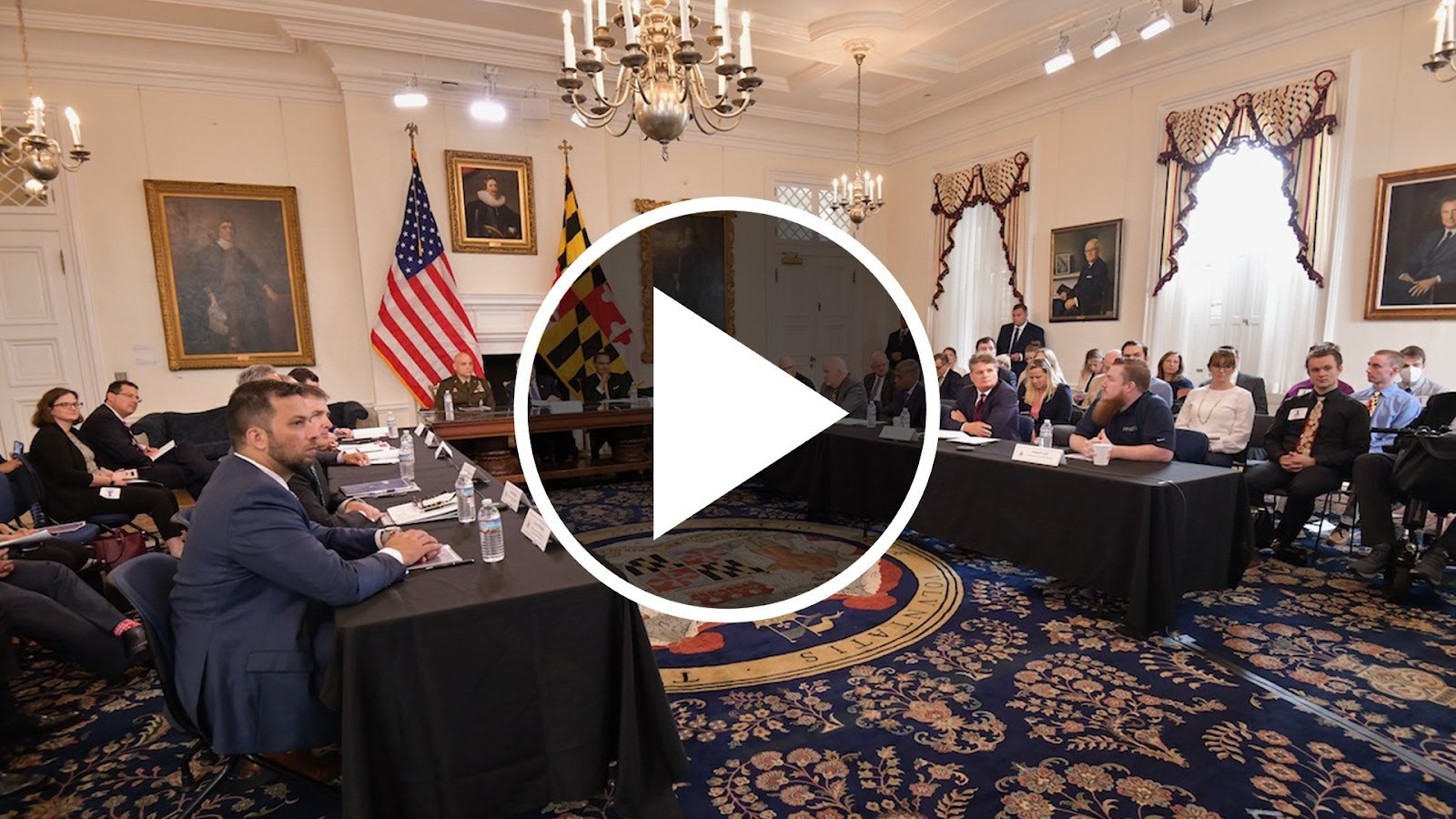Groundbreaking Agreement with UMBC to Establish Maryland Institute for
Innovative Computing, Deploy Cyber Rapid Response Teams
Issues Orders Creating Chief Privacy Officer, Chief Data Officer
New Data Analyst Partnership With NSA to Advise Maryland on Data Practices and Policies
ANNAPOLIS, MD—Governor Larry Hogan today convened a cybersecurity summit at the Maryland State House in Annapolis focused on coordinated federal, state, and private sector efforts to prepare for and address cybersecurity threats.
The summit brought together senior government officials, including leaders from the White House, Congress, the National Security Agency (NSA), and the FBI, as well as governors, academic leaders, and private sector experts.
“Public officials have no higher responsibility than keeping the American people safe, and there is no greater threat to their safety than the cyber vulnerabilities of the systems that support our daily lives,” said Governor Hogan. “Now, the time has come for leaders at all levels of government, along with stakeholders in the private sector and academia, to take immediate and decisive actions. We all have an important role to play.”
At the close of the summit, Governor Hogan enacted a range of initiatives that demonstrate Maryland’s continued commitment to strengthen its cyber ecosystem and protect critical infrastructure from cyberattacks:




Today’s summit builds on the successful Annapolis Infrastructure Summit held in April that included governors, U.S. senators, and leaders of the U.S. House Problem Solvers Caucus.
Participants in today’s summit included:
Anne Neuberger, Deputy National Security Advisor, Cyber & Emerging Tech at National Security Council, The White House
Congressman John M. Katko, Ranking Member on the House Committee on Homeland Security (virtual)
George C. Barnes, Deputy Director and Senior Civilian Leader, National Security Agency
Herbert J. Stapleton, Deputy Assistant Director, Cyber Division, Cyber Operations Branch, Federal Bureau of Investigation (FBI)
Admiral Dennis C. Blair, USN, Ret., Former United States Director of National Intelligence (virtual)
Dr. Freeman Hrabowski, President, UMBC
Governor Asa Hutchinson, Arkansas, NGA Chair (virtual)
Governor John Bel Edwards, Louisiana, NGA Resource Center for State Cybersecurity (virtual)
Ron Gula, Gula Tech Adventures
Timothy Blute, Director, Center for Best Practices, NGA
General Keith Alexander, USA, Ret., Founder, Chairman & Co-CEO, Iron Net
Daniel R. Ennis, Executive Director of the University of Maryland Cyber Initiative and CEO of DRE Consulting
Kevin Perkins, Senior Vice President and Chief Security Officer, Exelon CISO
Dr. Mohan Suntha, President and CEO, University of Maryland Medical System
Dr. Phyllis Schneck, Vice President and Chief Information Security Officer, Northrop Grumman (virtual)
Tina Williams-Koroma, President and CEO, TCecure CEO (virtual)
Robert Lee, Chief Executive Officer, Dragos
Keith Bowman, Dean, College of Engineering and Information Technology, UMBC
Innovative Computing, Deploy Cyber Rapid Response Teams
Issues Orders Creating Chief Privacy Officer, Chief Data Officer
New Data Analyst Partnership With NSA to Advise Maryland on Data Practices and Policies
ANNAPOLIS, MD—Governor Larry Hogan today convened a cybersecurity summit at the Maryland State House in Annapolis focused on coordinated federal, state, and private sector efforts to prepare for and address cybersecurity threats.
The summit brought together senior government officials, including leaders from the White House, Congress, the National Security Agency (NSA), and the FBI, as well as governors, academic leaders, and private sector experts.
“Public officials have no higher responsibility than keeping the American people safe, and there is no greater threat to their safety than the cyber vulnerabilities of the systems that support our daily lives,” said Governor Hogan. “Now, the time has come for leaders at all levels of government, along with stakeholders in the private sector and academia, to take immediate and decisive actions. We all have an important role to play.”
At the close of the summit, Governor Hogan enacted a range of initiatives that demonstrate Maryland’s continued commitment to strengthen its cyber ecosystem and protect critical infrastructure from cyberattacks:
- New partnership with the NSA to have a senior level data analyst advise the State of Maryland on enterprise data practice, policies, standards, and security. The NSA Data Analyst will coordinate with the Governor’s Office, the Chief Information Officer, the Council on Open Data, agency data leadership, and other key government, university, and private sector organizations on a comprehensive data architecture that guides and protects data throughout its life cycle.

- Memorandum of Understanding (MOU) with the University of Maryland, Baltimore County (UMBC) to establish a new Maryland Institute for Innovative Computing. Governor Hogan and UMBC President Freeman Hrabowski signed a groundbreaking agreement to create a new Maryland Institute for Innovative Computing (MIIC), which will team students and faculty with leaders of state and local agencies to address some of Maryland’s most pressing workforce and technology challenges—particularly in the areas of cybersecurity, artificial intelligence, and data science.Through this partnership, UMBC and the state will collaborate to create Cyber Rapid Response Teams that could deploy quickly to assist state agencies and local governments with responding to attacks and breaches as they occur. This new entity will also house a Strategic Technology Investment Fund to assist state agencies with the resources they need to solve IT and data challenges, and to support further expansion of the state’s IT workforce. Read the MOU.

- Codifying a statewide privacy framework to govern the way the state secures citizens’ personal information. Governor Hogan enacted an executive order creating a strong privacy framework for state agencies to properly collect, use, retain, and disclose personally identifiable information. The order creates a State Chief Privacy Officer (SCPO), who will be charged with overseeing the development, implementation, maintenance of, and adherence to policies and procedures covering the privacy of personally identifiable information. The order also requires that the principal executive units each appoint an agency privacy official who will work with the SCPO to inventory data, systems, and applications that hold personally identifiable information. Read the order.

- Institutionalizing a whole-of-government strategic approach for effective data governance. Governor Hogan enacted an executive order creating a State Chief Data Officer (SCDO), who is charged with supervising data use and management and facilitating inter-agency data sharing. The order also directs state agencies to appoint an agency data officer to support and work with the SCDO to oversee the internal and external data affairs of the agency. Together, the SCDO and agency data officers will assess and make recommendations regarding Maryland’s data landscape to produce a strategic state data plan. Read the order.

- Expanding the scope of the Maryland Total Human-services Integrated Network (MD THINK). Governor Hogan enacted an executive order formally establishing the MD THINK Committee to govern the way state agencies share and utilize data. MD THINK, the state’s first-in-the-nation cloud-based data repository, allows multiple state agencies to share and manage data. The executive order further establishes that MD THINK shared data will be leveraged to support the Two Generation Family Economic Security Commission in transforming the state’s interactions with families and to develop policy recommendations to reduce the effects of adverse childhood experiences. The order also aligns the Medicaid Modernization Transformation program with MD THINK to enable a more holistic use of state programs, modernize the delivery of additional health and human services, and benefit Maryland’s vulnerable individuals and families. Read the order.
Today’s summit builds on the successful Annapolis Infrastructure Summit held in April that included governors, U.S. senators, and leaders of the U.S. House Problem Solvers Caucus.
Participants in today’s summit included:
Anne Neuberger, Deputy National Security Advisor, Cyber & Emerging Tech at National Security Council, The White House
Congressman John M. Katko, Ranking Member on the House Committee on Homeland Security (virtual)
George C. Barnes, Deputy Director and Senior Civilian Leader, National Security Agency
Herbert J. Stapleton, Deputy Assistant Director, Cyber Division, Cyber Operations Branch, Federal Bureau of Investigation (FBI)
Admiral Dennis C. Blair, USN, Ret., Former United States Director of National Intelligence (virtual)
Dr. Freeman Hrabowski, President, UMBC
Governor Asa Hutchinson, Arkansas, NGA Chair (virtual)
Governor John Bel Edwards, Louisiana, NGA Resource Center for State Cybersecurity (virtual)
Ron Gula, Gula Tech Adventures
Timothy Blute, Director, Center for Best Practices, NGA
General Keith Alexander, USA, Ret., Founder, Chairman & Co-CEO, Iron Net
Daniel R. Ennis, Executive Director of the University of Maryland Cyber Initiative and CEO of DRE Consulting
Kevin Perkins, Senior Vice President and Chief Security Officer, Exelon CISO
Dr. Mohan Suntha, President and CEO, University of Maryland Medical System
Dr. Phyllis Schneck, Vice President and Chief Information Security Officer, Northrop Grumman (virtual)
Tina Williams-Koroma, President and CEO, TCecure CEO (virtual)
Robert Lee, Chief Executive Officer, Dragos
Keith Bowman, Dean, College of Engineering and Information Technology, UMBC
–###-

